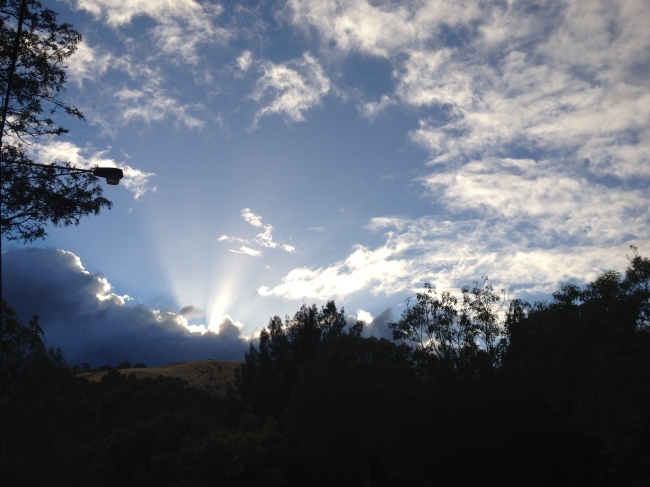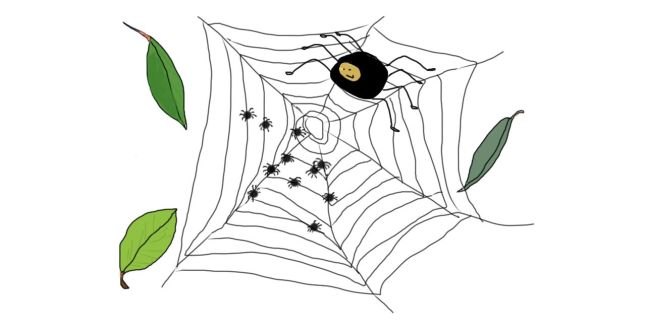Over the last week I suddenly got very busy with work and various appointments – and realised that I hadn’t posted anything for several days! Oops! There goes my A to Z for April Challenge. Oh well, I will still get to Z, but just not in one month.
This story came to me from nowhere. I’ve always found cemeteries to be quite moving places. In some parts of the world it’s a tradition to visit the graves of your ancestors during the year, to pay respects and remember them in life.
Lina woke to the sun slanting through her curtains. Usually the day started in the dark. She panicked for a moment – she’d miss the train to school – and then remembered: it was the Day of Souls. It was a public holiday and meant a trip out to the middle of nowhere to the cemetery that held grandma and grandpa’s graves.
After getting dressed Lina helped her mother pack a picnic lunch and prepare water and a brush for cleaning the graves.
‘We’d better get going or we’ll be late,’ said Lina’s father, picking up the picnic basket.
They made it to the train station in ten minutes. Families were milling about along the platform. A train pulled in and a flood of people poured out. Lina’s father anxiously checked the train timetable. ‘Hope they haven’t been held up,’ he said.
‘If they have they would’ve let us know,’ said Lina’s mother.
‘They’ll be here,’ said Lina, watching a young couple hurry by, hand in hand. She was watching them disappear down the stairway when she felt a hand touch her shoulder.
‘Lee-lee! What’s got your attention?’ Lina’s sister Karen, embracing her. She held a basket with two bunches of white lilies. ‘Could it be a handsome young man by any chance?’
‘I’m not the one with the boy fixation,’ Lina laughed.
Lina’s brother was standing behind. Josh grinned and gave her a one-armed hug. ‘Good to see you again, little sis.’
‘Come on, you three, here’s the train now,’ said Lina’s father. They all followed him into a carriage and found a cluster of seats.
Between the standing commuters Lina caught glimpses of the tightly packed city buildings. It was a blur of concrete grey and bright advertisements. She half-listened to her parents asking her siblings questions about work, university, apartments. As the city gave way to green, the train became less crowded. Lina saw fields and farms as the train flew across the land.
Their stop was the second to last on this line. The station was old and open to the elements. Three other families got off at the same stop and they all made their way down the lane that led to the cemetery. It was a lushly green part of the world; dark green hills towered in the distance and a river rushed nearby. Karen’s laugh seemed to reach further out here.
.jpg)
‘Ross Bay Cemetery Fall Colors,’ 30 November 2013, Image courtesy of Wikimedia.
The cemetery was old but well-tended. Rows of graves spread out into a roughly rectangular area. Most of the autumn leaves from the maples and beech trees had been swept away. Some graves were ancient and crumbling and pitted, the names engraved almost indecipherable. Others were newer and had not yet settled into the earth.
Lina’s siblings became quiet as they walked down the centre path and turned down the one that led to their family’s burial area. Grandma and grandpa’s graves were identical except for the names and epitaphs. Grandma Suzie, Grandpa Jack. Died within four years of each other and came back home to rest together.
Lina’s mother knelt before the graves and removed the heavy vases that still held remnants of old flowers. Lina and Josh took the vases and emptied them out at the edge of the cemetery. Lina’s mother brought out the brush and water bottle from her bag and carefully swept away leaves, dirt and twigs from the graves. She stepped away as Lina’s father poured water over. It caught the sunlight as it ran over and down the sides of the headstones. Karen crouched down and put the flowers in each vase and set them on the headstone.
Lina saw her parents bow their heads and lowered hers. She listened to the wood doves cooing and the distant drone of a car and remembered her grandparents. They had always been old to her; her grandpa had been a quiet, stern man who took them to the bakery for jam and cream buns. Her grandma had been warm and was always in the garden with her roses. Lina remembered Josh receiving a sharp telling off for kicking a ball into the garden and snapping off rose branches. She remembered hot sweet cups of tea and buttery biscuits in front of the television, and her grandpa’s rare cheeky smile.
Patchy sunlight fell onto Lina’s face as she stood before her grandparents and their parents, who were grown into the earth. Around her was her family. Kin.
.jpg)

